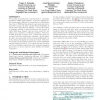Free Online Productivity Tools
i2Speak
i2Symbol
i2OCR
iTex2Img
iWeb2Print
iWeb2Shot
i2Type
iPdf2Split
iPdf2Merge
i2Bopomofo
i2Arabic
i2Style
i2Image
i2PDF
iLatex2Rtf
Sci2ools
105
click to vote
DOCENG
2011
ACM
2011
ACM
Contributions to the study of SMS spam filtering: new collection and results
The growth of mobile phone users has lead to a dramatic increasing of SMS spam messages. In practice, fighting mobile phone spam is difficult by several factors, including the lower rate of SMS that has allowed many users and service providers to ignore the issue, and the limited availability of mobile phone spam-filtering software. On the other hand, in academic settings, a major handicap is the scarcity of public SMS spam datasets, that are sorely needed for validation and comparison of different classifiers. Moreover, as SMS messages are fairly short, content-based spam filters may have their performance degraded. In this paper, we offer a new real, public and non-encoded SMS spam collection that is the largest one as far as we know. Moreover, we compare the performance achieved by several established machine learning methods. The results indicate that Support Vector Machine outperforms other evaluated classifiers and, hence, it can be used as a good baseline for further com...
DOCENG 2011 | Document Analysis | Information Storage And Retrieval | Mobile Phone Users | Support Vector Machine |
| Added | 18 Dec 2011 |
| Updated | 18 Dec 2011 |
| Type | Journal |
| Year | 2011 |
| Where | DOCENG |
| Authors | Tiago A. Almeida, José María Gómez Hidalgo, Akebo Yamakami |
Comments (0)

